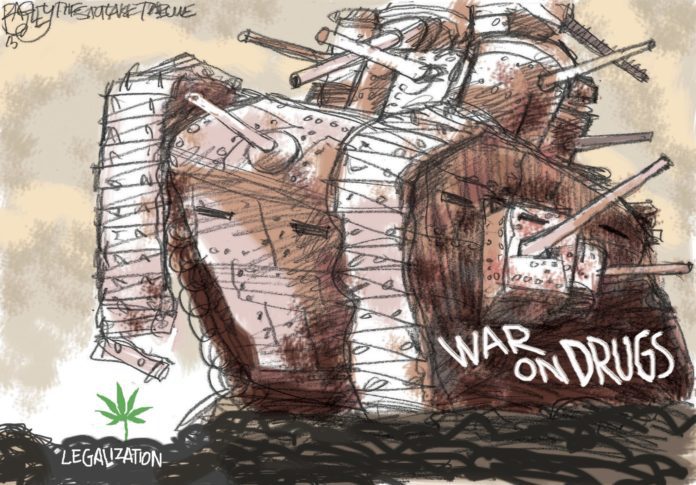BY VERN TURNER
 Netflix recently produced a violent series called Narcos. It attempted to chronicle the Colombian drug history in a partially fictionalized story about the infamous Pablo Escobar, the man who would assume to be president of Colombia. Not only was it violent in the sense of people shooting other people as if they were midway games at the county fair, but it showed how close violence is to the surface of otherwise decent people.
Netflix recently produced a violent series called Narcos. It attempted to chronicle the Colombian drug history in a partially fictionalized story about the infamous Pablo Escobar, the man who would assume to be president of Colombia. Not only was it violent in the sense of people shooting other people as if they were midway games at the county fair, but it showed how close violence is to the surface of otherwise decent people.
The rise of the Medellin and Cali drug cartels was rapid and stunning in its breadth as was the control those cartels had over the government of that incredibly beautiful country. Things began to get serious when a Chilean ex-patriot fled the Pinochet purges and set up shop in the jungles of Colombia making powder cocaine from the readily available coca plants growing on the eastern slopes of the Andes mountains.
Escobar was an itinerant smuggler of anything and everything including marijuana. There was no route or method he didn’t know, no official he couldn’t bribe to look the other way and no depth of depravity he wouldn’t sink to in order to keep the product flowing. Additionally, in the ‘60s and ‘70s there was much less interdiction of smuggled weapons, drugs or other contraband into the United States. What cocaine provided to the smugglers was a whole new economy that dwarfed the previous smuggling activities. How did this come to pass?
The Colombians discovered that the United States provided a virtually unlimited demand for cocaine by a people with plenty of disposable income and a penchant for getting high on a drug that had a stronger kick than marijuana and was somewhat less dangerous than heroine … or so they thought. Nevertheless, for as much weight as the Escobar operation could deliver to Miami, the demand from the dealers was always for more.
More is what they got. Escobar, being an industrious sort, streamlined the cocaine process, upgraded the factories and labs while moving some of them into the city of Medellin itself. He was literally running these labs at 24/7 rates and shipping hundreds of kilograms [Kilos] per week to the United States. A kilogram, by the way, weighs about 2.21 pounds. Not only did the manufacturing of the drug become more efficient and wider spread, the methods of transport had to keep pace with the demand too as well as the by the late wake-up calls by interdiction agencies in the U.S.
The “War on Drugs” began in earnest in the U.S. and billions of dollars were poured into interdiction and arrests. It was the smugglers at the tip of the spear that received the most attention and endured the most risk. Still, an estimated 90% of the smuggled product made it to the nostrils of American children and adults.
The methods of transport became ingenious and even macabre with women swallowing condoms filled with cocaine before boarding flights to Miami or other American cities from Columbia. Sometimes those “mules” had their cargo burst inside them and killed them in short order. This shocking discovery led to even more attempts to interdict and stop the drug flowing into the country.
The smuggling race was much like an arms race as competing technologies kept leaping past one another. The product, however, just kept flowing.
Many of us have heard about undercover DEA agent Kiki Camarena’s torture death while exposing the cartel’s operations in Mexico. Rooms filled with American currency shrink-wrapped on pallets showed our government and citizens how large the demand really was.
Escobar, at one time, probably had enough money to run the budget of the entire nation of Colombia … in cash, billions of dollars in American greenbacks. This was what some cynics called our illegal foreign aid to Third World nations.
The thing is, they were right. The growing of coca became the crop second only to coffee in Colombia. Entire regions were financially and economically dependent on the American demand for cocaine. This demand spread to Europe and Asia as well, but it was the U.S. leading the league in white nostrils per capita.
Rhetorical questions were asked then, and are being asked now, that sound silly and sophomoric. Why do Americans demand so many drugs for “recreational” use? Our kids and adults have more distractions, sports and games to play than any nation on Earth. We lead the league in video games, computer games, professional sports, amateur sports, school sports, school clubs, country clubs, clubs for this and clubs for that. We also lead the league in length of work year. Most other countries allow employees up to six weeks in vacation. We do not. Our people are, on a per capital basis, not that well paid, yet have enough disposable income for games, booze, gambling and drugs.
Why the drugs? Why the need to “escape”? Is just plain reality too much [or too little] to handle? Must we feel out of ourselves to feel whole?
With all the available distractions at virtually everyone’s fingertips, why do Americans need to snort cocaine, shoot heroine or deep-fry their brains with methamphetamine? Is it boredom? Are the games too hard to play? Are our people too illiterate to read the rules and instructions for video games?
Yes, yes, humans have always looked for mind-altering assistance from nature. From mushrooms to peyote to beer to liquor to cannabinoids, humans have looked to mother nature to provide a basis for mind alteration. As we became more sophisticated and knowledgable, our mind drug inventions followed suit, with concentrated LSD being one of the pinnacles of those discoveries.
The recurring rhetorical question is why? I’m guessing it’s all of the above. We are who and what we are, after all. Maybe we see drug-induced trips as mind quests … or something.
The thing is, most of these drugs can be lethal. The infamous story of the great basketball prospect Len Bias is a perfect example. After being drafted by the Boston Celtics, he celebrated with friends who gave him his first dose of cocaine. It killed him on the spot. Some of these chemicals are not for everyone. Are we trying another experiment in Darwinism to see who can survive them?
Meanwhile, our American drug habit fuels and feeds Third World economies on a basic supply and demand basis. That’s the theory of Adam Smith from long ago and it still works today.
The difference is these products are lethal and illegal and the humans manufacturing and transporting and using these products don’t seem to care that lives are being ruined or ended because of those economic imperatives.
Would less lives be lost from illegal drug trafficking if we made all this stuff legal? What would happen to demand then? Has legalizing marijuana chilled demand? Nope. What has happened instead is that the government is becoming rich, fewer drug traffickers are dying, the MJ cash cow for drug traffickers is drying up and alcohol abuse is dropping.
Alcohol, one might remember, is legal. It is also involved with over 70% of our traffic and gun deaths in the United States. No such data relates to marijuana use. We might want to re-examine our views on that plant’s value to the human condition, before mislabeling it yet again.
If it’s about the economics, consider how many billions of dollars are wasted on a failed drug war, and how it could be better used for education, rehab and providing jobs for the poor people who are more susceptible to knock-off drugs that are even more dangerous than cocaine.
Another consideration is the number of generations of our young people who have seen the drug culture become the normal lifestyle in our cities and suburbs and are forever affected by it.
If they think it’s “normal” to have thugs, guns and dope around, how will they behave in parts of life where these things aren’t the primary environment? Will these kids even know how to trust anyone at all? How will they parent their kids if their own parents were or are part of the drug culture? Is that how demand for a product is perpetuated?
Obviously, there is more to discuss on this topic, but the economics from Hell can’t be part of the conversation if humans are going to become worthy of one another in the 21st Century where eight to 12 billion of us will be clamoring for declining resources, food and clean water while our planet warms and fertile soil becomes more rare.
We may want to re-evaluate what our priorities are regarding our self-indulgence fueled by our self-absorption, self-pity and self-destruction.
– Vern Turner lives in Marble Falls, TX and is a regular contributor to The Oklahoma Observer. His latest book, Racing to the Brink: The End Game for Race and Capitalism, is available through Amazon.com.








